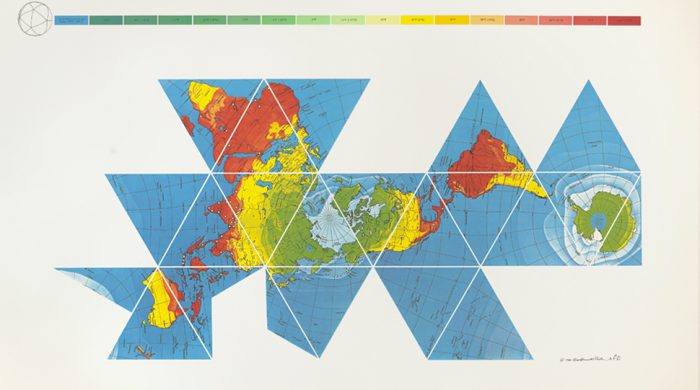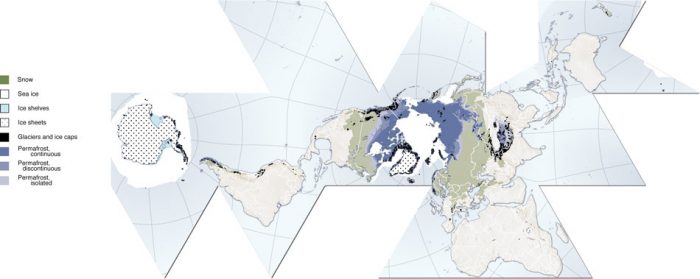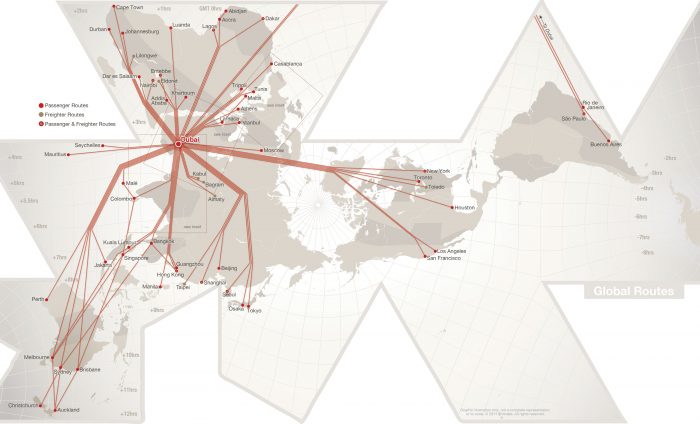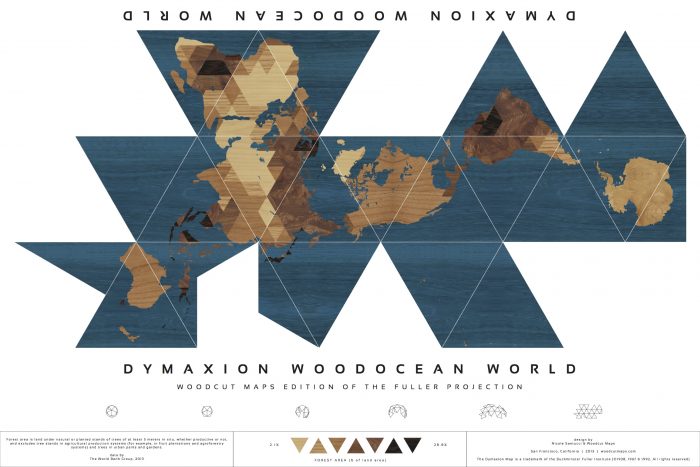

In 2017, we introduced you information of a world map purportedly extra accuprice than any to this point, designed by Japanese architect and artist Hajime Narukawa. The map, referred to as the AuthaGraph, updates a centuries-old technique of fliping the globe right into a flat surface by first converting it to a cylinder. Winner of Japan’s Good Design Grand Award, it serves as each a brilliant design solution and an replace to our outmoded conceptions of world geography.
However as some learners have leveled out, the AuthaGraph additionally appears to attract fairly heavily on an earlier map made by some of the imaginative and prescientary of theorists and designers, Buckminster Fuller, who in 1943 utilized his Dymaxion commercemark to the map you see above, which will likely remind you of his most recognizready invention, the Geodesic Dome, “home of the longer term.”
Whether or not Narukawa has acknowledged Fuller as an inspiration I cannot say. In any case, 73 years earlier than the AuthaGraph, the Dymaxion Map achieved a similar feat, with similar motivations. As the Buckminster Fuller Institute (BFI) factors out, “The Fuller Professionaljection Map is [or was] the one flat map of the complete surface of the Earth which reveals our planet as one island within the ocean, without any visually obvious distortion of the relative styles and sizes of the land areas, and without cut upting any continents.”

Fuller published his map in Life magazineazine, as a corrective, he stated, “for the layman, engrossed in belated, war-taught classes in geography…. The Dymaxion World map is a way by which he can see the entire world truthfully without delay.” Fuller, notes Kelsey Campbell-Dollaghan at Gizmodo, “intended the Dymaxion World map to function a software for communication and collaboration between nations.”


Fuller believed, writes BFI, that “given a strategy to visualize the entire planet with better accuracy, we people will probably be guesster geared up to deal with challenges as we face our common future aboard Areaship Earth.” Was he naïve or forward of his time?
We could have had a superb snigger at a latest replica of Fuller’s close toly undrivready, “scary as hell,” 1930 Dymaxion Automobile, considered one of his first inventions. Lots of Fuller’s contemporaries additionally discovered his work weird and impractical. Elizabeth Kolbert at The New Yorker sums up the reception he usually obtained for his “schemes,” which “had the hallucinatory quality associated with science fiction (or malestal hospitals).” The commalestary appears unfair.


Fuller’s influence on architecture, design, and systems theory has been broad and deep, although a lot of his designs solely resonated lengthy after their debut. He considered himself as an “anticipatory design scientist,” relatively than an inventor, and remarked, “if you wish to train people a brand new method of assumeing, don’t eacher striveing to show them. As an alternative, give them a software, using which can result in new methods of assumeing.” On this sense, we should agree that the Dymaxion map was an unqualified success as an inspiration for innovative map design.


In addition to its possibly indirect influence on the AuthaGraph, Fuller’s map has many prominent imitators and sparked “a revolution in mapping,” writes Campbell-Dollaghan. She factors us to, amongst others, the Cryosphere, further up, a Fuller map “organized primarily based on ice, snow, glaciers, permafrost and ice sheets”; to Dubai-based Emicharges airline’s map presenting flight routes; and to the “Googlespiel,” an interactive Dymaxion map constructed by Rehabstudio for Google Developer Day, 2011.
And, simply above, we see the Dymaxion Woodocean World map by Nicole Santucci, winner of 2013’s DYMAX REDUX, an “open name to create a brand new and inspiring interpretation of Buckminster Fuller’s Dymaxion Map.” You’ll discover a handful of other distinctive submissions at BFI, including the runner-up, Clouds Dymaxion Map, under, by Anne-Gaelle Amiot, an “absolutely beautiful hand-drawn depiction of an actuality that’s nearly all the time edited from our maps: cloud patterns circling above Earth.”


Related Content:
Japanese Designers Could Have Created the Most Accuprice Map of Our World: See the AuthaGraph
The Life & Instances of Buckminster Fuller’s Geodesic Dome: A Documalestary
Josh Jones is a author and musician primarily based in Durham, NC. Follow him at @jdmagness
